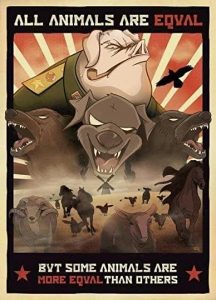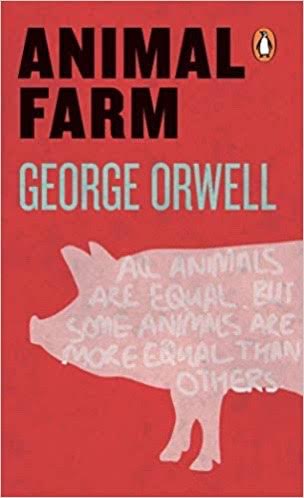Animal Farm, anti-utopian satire by George Orwell published in 1945. One of Orwell’s finest works, it is a political fable based on the events of Russia’s Bolshevik revolution and the betrayal of the cause by Joseph Stalin.
Orwell tells a farmyard story, casting revolutionary leaders Vladimir Lenin, Leon Trotsky, and Stalin as pigs respectively named Major, Snowball and Napoleon, which alongside then other animals, rebel against their tyrannical farmer Mr. Jones, representing the Tsar of Russia and decide to set up their own form of government.
At the start of the novel, Lenin as the pig named Old Major rouses the animals to rebel against the “tyranny of man” much like he did in 1917 with the Russian revolution, rounding up all the citizens, dissatisfied with the state of Russia during the beginning of the century, under the manifesto of Marx’ communism to take down and end the tyrannical Tsar. The animals, victorious, take over, and with a newfound sense of dignity set about everyday tasks such as harvesting hay for the good of all, much the manifesto intended. However, the pigs have only just posted the “seven commandments of Animalism,” including the tenet that “all animals are equal,” but soon they decide to leave the hard labor to the other animals and appropriate exclusively for themselves the comforts of the farmhouse. Here Napoleon, after driving out Snowball who tried to go against him by gaining the sympathy of the animals, culminates in his dictatorship tragically inflecting the lives of the common animals, who continue to toil in the belief that they are forging Old Major’s republic like blind sheep ignoring the truth of a revolution, ideology and leader which has betrayed them. The book ends with Napoleon, now dictator of the farm, replacing the seven commandment with only one “All animals are equal, but some animals are more equal than others” which is used by Orwell to comment on the hypocrisy of governments that proclaim the absolute equality of their citizens but give power and privileges to a small elite, in this case, the pigs representing Stalin and his allies.

The grand theme of Animal Farm has to do with the capacity for ordinary individuals to continue to believe in a revolution that has been utterly betrayed revealing how those in power prevent the democratic promise of the revolution for their own sake and thirst for power. It is through the depiction of ordinary animals who unknowingly and willingly give their all to a system they believe in but is exploiting them to every extend that Orwell manages to create an emotional force transcending the simplicity of a fable. Through the example of Boxer the horse, who works his hardest to satisfy the teaching of his new masters and selflessly promising that he’d work harder even though he already is the hardest working animal, the author shows how little the ones at the top of the government care for the individual as when Boxer nearly works himself to death and gets sick because of it, Napoleon, instead of sending him to the hospital, sells him to the slaughterhouse, then spends the money from his corpse on whiskey for the pigs, showing how the heads of the government see the individual citizen as something to exploit to the fullest and to get rid of once it doesn’t have anymore uses to them.
In the end we can conclude that at its core the human is an egotistical and selfish being who cares only about their own success and power uncaring of the consequences of their action.
Davide Guida 2Q classico Cambridge 2.0 – liceo Vico Napoli
